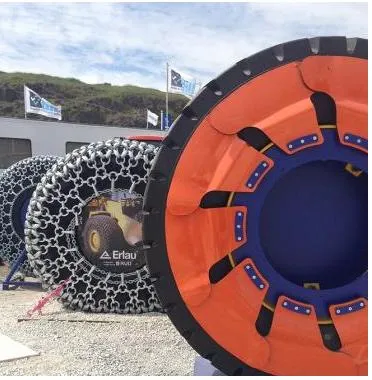The Bridgestone Tyre Pressure Monitoring System (TPMS) comprises sensors that are fitted to tyre valves, a receiver unit and analytic software. The sensors measure tyre pressure and transmit the data via Bluetooth to the receiver for analysis. The system comes in three options – a handheld receiver whereby a driver can log individual tyre pressures, a gate-mounted receiver for locations with many vehicles passing a single monitoring point, and an on-board receiver for vehicles that tend to operate off-site, such as mobile cranes. TPMS enables users to easily monitor tyre pressure to improve tyre life and get early warning where issues might be developing. The system will produce alerts when tyre pressures cross specific thresholds. Bridgestone’s Total Tyre Care system also includes the Tyre Management System, professional services for tyre selection maintenance and support, and the company’s range of premium tyres.
Bridgestone also showed its recently-introduced 35/65R33 V-Steel N-Traction (VSNT) 4*-rated off-road tyre that it has specifically developed for underground haulage operations that use heavier shuttle trucks. Underground applications are similar to surface operations but require smaller tyre sizes due to the physical constraints. A higher load capacity per air volume is therefore needed, as provided by the VSNT 4* rating.
Bridgestone adds tyre pressure monitoring system
Bridgestone has added a tyre pressure monitoring system to its Total Tyre Care programme for maximising tyre life and reducing total cost of ownership. The Bridgestone Tyre Pressure Monitoring System (TPMS) comprises sensors that are fitted to tyre valves, a receiver unit and analytic software.
April 23, 2015
Read time: 2 mins








